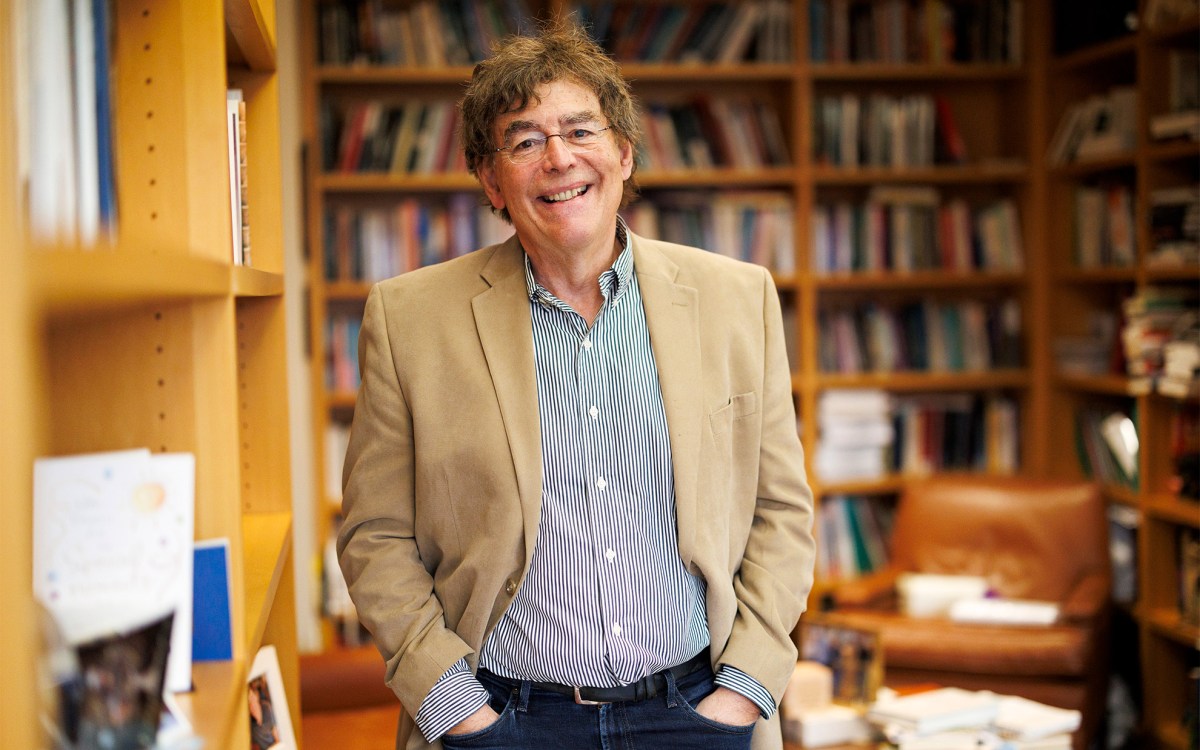Science & Tech
-

Rethinking — and reframing — superintelligence
Microsoft researcher says separating AI from people makes systems dangerous and unproductive
-

First, male gets heated up, then female, and then, you know
Study shows infrared radiation from plants serves as invitation to pollinating insects
-

‘Consciousness’
What we know and don’t know about the life of your mind
-

Science needs contrarians, and contrarians need support
Institute of Quantitative Social Science initiative tailored to researchers exploring provocative ideas
-

Cracking the code of why, when some choose to ‘self-handicap’
New research also offers hints for devising ways to stop students from creating obstacles to success

-

How memory works (and doesn’t)
In podcast, scientists explain why remembering is more reconstruction than replay
-
Matthew Shair imitates, improves on nature
Matthew Shair and his students work in “protein trafficking.” Genes in living cells carry instructions for making proteins essential to life. These proteins have to get from place to place…
-
Where do you want your building?
Humans are changing location more frequently and in greater numbers than ever before in history. But at the same time, the electronic revolution is allowing them to remain in contact…
-
Researchers regenerate zebrafish heart muscle
A research team led by Mark T. Keating showed that zebrafish can regenerate heart muscle within two months after a severe injury. The team, from the Howard Hughes Medical Institute…
-
New 3-D mammography system may improve breast imaging
Researcher Elizabeth Rafferty of the Massachusetts General Hospital Breast Imaging Service described initial results of a study comparing a new technique, called digital tomosynthesis, to standard mammography. Among the new…
-
Geographical information systems conference showcases the future
Begun as a mapping software decades ago, geographical information systems, known as GIS, today functions to manage different time- and place-dependent data and allows different variables to be projected together,…
-
Exploring black political thought, now and then
Professor Michael Dawson’s most recent book, “Black Visions: The Roots of Contemporary African American Mass Political Ideologies” (University of Chicago Press, 2001), brings a historical perspective to black political ideologies.…
-
Boston bike messengers experience very high injury rate
Bike couriers have become as a much a part of the urban landscape as sky-scrapers and traffic-clogged streets. Boston messengers collectively make between 3,000 and 4,000 deliveries on a given…
-
Scientists look inside antimatter
“We have obtained the first glimpse inside an antihydrogen atom, and this is a significant step on the way to precision measurements that will allow matter/antimatter comparisons to be made,”…
-
McElroy says it’s time to stop seeing global warming as political issue
Michael B. McElroy, Gilbert Butler Professor of Environmental Studies and director of Harvard’s Center for the Environment, is among the scientists who since the 1970s have been using paleoclimatic data…
-
Prying the lid off the FDA
Even though asthma is responsible for more deaths and more hospitalizations than arthritis in the United States, the greater political influence of arthritis sufferers prompts the federal Food and Drug…
-
Regrowing missing teeth may someday be possibility
Regrowing missing teeth may someday be a possibility, based on work by a team of scientists at the Forsyth Institute, an independent, Harvard-affiliated research organization specializing in oral and craniofacial…
-
Missy Holbrook investigates the world of plants
Every day an oak tree moves hundreds of gallons of water up from the soil and out, in evaporated form, through its leaves. “Mechanically, it’s a pretty substantial feat,” says…
-
Beetle mania
Grain weevils alone cost the global economy about $35 billion, or a third of the world’s grain crop, every year. Various other beetle species damage dozens of crops including bamboo,…
-
Harvard science historian publishes results of unprecedented 30-year census of Copernican masterpiece
First published in 1543, Nicholas Copernicus’ De revolutionibus orbium coelestium introduced the world to the concept of a sun-centered universe. In it, Copernicus detailed how the motions of the sun,…
-
Genetic sonograms may reduce need for amniocentesis
Radiologist Beryl Benacerraf is a Harvard Medical School clinical professor of obstetrics, gynecology and reproductive biology at Brigham and Women’s Hospital. Benacerraf, a handful of like-minded maternal-fetal ultrasound specialists, and…
-
Putting bacteria to work
A nautical group of bacteria known as Prochlorococcus removes carbon dioxide from air and fixes it into the carbon content of their own tiny bodies. The more carbon dioxide they…
-
Undergraduates observe Rwandan attempts at justice
The Rwandan genocide memorial was a tiny one-room church, pervaded still by a penetrating stench. On a table in the church was a pile of human skulls and femurs, a…
-
Website saves wet books
Wondering what to do if you discover a bunch of old books are floating in backed-up sewer water or if a parchment manuscript gets soaked by an automatic sprinkler? The…
-
When problem-solving is a problem
If an ill-timed delivery left them short of linens, nurses observed by Harvard Business School doctoral student Anita Tucker found a way to borrow from another unit. Such initiative taking…
-
Researcher wins Nobel Prize for work in X-ray astronomy
Riccardo Giacconi worked at the Harvard-Smithsonian Center for Astrophysics from 1973 to 1981. During that period, he led the development of the Einstein X-ray Observatory, which was launched in 1978.…
-
The myth of American isolationism
American diplomacy in the 1920s was subtle but ambitious and effective, instead of isolationist, argues Harvard Assistant Professor of Government Bear F. Braumoeller. American policy in the years leading up…
-
Daddy longlegs have a global reach
Huge numbers of arachnid and insect species remain unknown. Arachnologists like Gonzalo Giribet, toiling in relative obscurity, routinely identify new species – and their work is far from over. Giribet,…
-
From cradle to grave
Astronomers have been using the Chandra X-ray Observatory and radio telescopes to observe two opposing jets of high-energy particles emitted following an outburst, first detected in 1998 by NASA’s Rossi…
-
Report documents health effect of biodiversity
A new report catalogues the connections between biodiversity and human health. The interim executive summary was presented at the United Nations in late October 2002, following the U.N. World Summit…
-
Heinz Center report presents environmental indicators
Statistics and reports on environmental damage and progress routinely come from dozens — if not hundreds — of nonprofit, government, and other agencies. Often the information disagrees with previously published…
-
Pregnancy and delivery deadly for many Afghan women
Lynn Amowitz, a researcher at Brigham and Women’s Hospital an a medical instructor at Harvard Medical School, found that women in the Herat province of Afghanistan receive some of the…
-
Battling toxic molds
Molds are found in all kinds of environments. Estimates of the number of kinds of molds range from tens of thousands to more than 300,000, with more than 1,000 species…
-
Harvard Law School researchers track China’s Web filtering policies
“We’re hoping to make clear what’s blocked and what’s not—something only previously understood piecemeal,” said Professor Jonathan Zittrain, faculty co-director of the Berkman Center. “With the right data, we can…
-
Information Age will change doctors’ role in healing
Even as the Internet allows patients access to information previously only available through their doctors, patients still trust the information they get from their doctors more than they do from…
-
Beyond the Beltway: Focusing on Hometown Security
“Beyond the Beltway: Focusing on Hometown Security,” prepared by participants in the Kennedy School’s Executive Session on Domestic Preparedness, calls upon federal officials to place greater emphasis upon local emergency…

